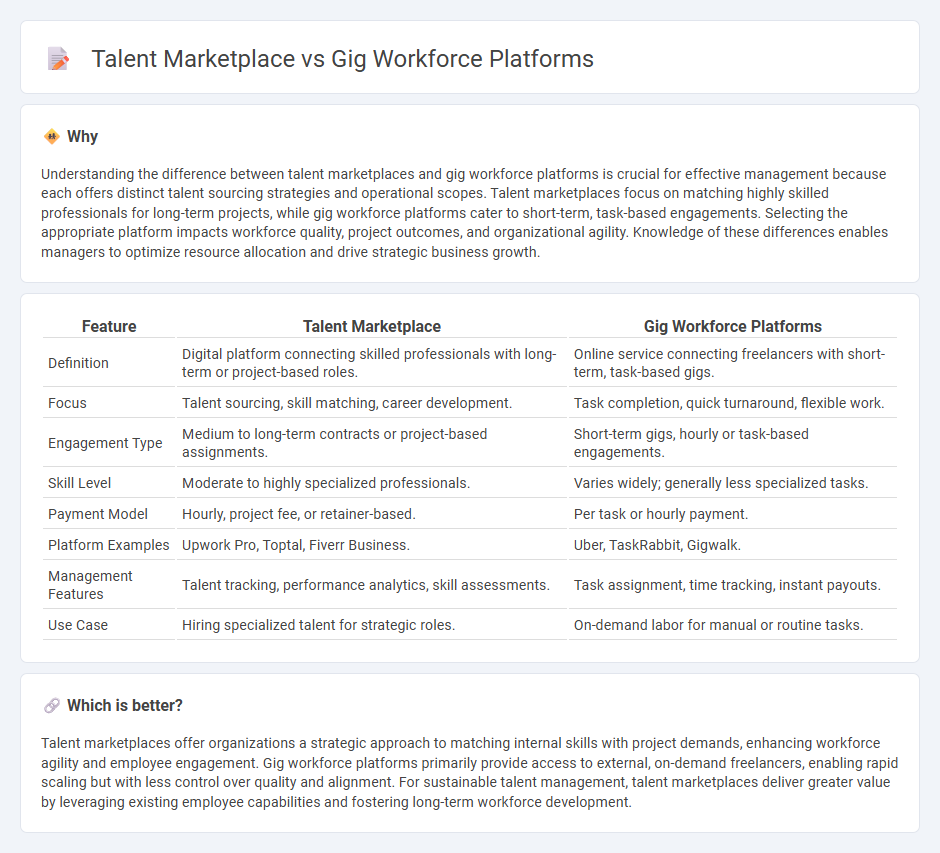
Talent marketplaces connect businesses with skilled professionals for long-term projects, emphasizing matching expertise with organizational needs and fostering ongoing collaboration. Gig workforce platforms focus on short-term, task-oriented engagements, offering flexible, on-demand labor solutions for specific tasks or assignments. Explore the differences between these models to understand which suits your business strategy best.
Why it is important
Understanding the difference between talent marketplaces and gig workforce platforms is crucial for effective management because each offers distinct talent sourcing strategies and operational scopes. Talent marketplaces focus on matching highly skilled professionals for long-term projects, while gig workforce platforms cater to short-term, task-based engagements. Selecting the appropriate platform impacts workforce quality, project outcomes, and organizational agility. Knowledge of these differences enables managers to optimize resource allocation and drive strategic business growth.
Comparison Table
| Feature | Talent Marketplace | Gig Workforce Platforms |
|---|---|---|
| Definition | Digital platform connecting skilled professionals with long-term or project-based roles. | Online service connecting freelancers with short-term, task-based gigs. |
| Focus | Talent sourcing, skill matching, career development. | Task completion, quick turnaround, flexible work. |
| Engagement Type | Medium to long-term contracts or project-based assignments. | Short-term gigs, hourly or task-based engagements. |
| Skill Level | Moderate to highly specialized professionals. | Varies widely; generally less specialized tasks. |
| Payment Model | Hourly, project fee, or retainer-based. | Per task or hourly payment. |
| Platform Examples | Upwork Pro, Toptal, Fiverr Business. | Uber, TaskRabbit, Gigwalk. |
| Management Features | Talent tracking, performance analytics, skill assessments. | Task assignment, time tracking, instant payouts. |
| Use Case | Hiring specialized talent for strategic roles. | On-demand labor for manual or routine tasks. |
Which is better?
Talent marketplaces offer organizations a strategic approach to matching internal skills with project demands, enhancing workforce agility and employee engagement. Gig workforce platforms primarily provide access to external, on-demand freelancers, enabling rapid scaling but with less control over quality and alignment. For sustainable talent management, talent marketplaces deliver greater value by leveraging existing employee capabilities and fostering long-term workforce development.
Connection
Talent marketplaces and gig workforce platforms are interconnected as they both facilitate flexible, project-based employment by matching skilled professionals with organizations seeking specific expertise. These platforms leverage AI-driven algorithms and data analytics to optimize talent discovery, engagement, and workflow management across diverse industries. By enabling real-time access to a global pool of freelancers and contingent workers, they streamline workforce agility and enhance operational efficiency.
Key Terms
Flexibility
Gig workforce platforms offer on-demand, project-based flexibility, allowing businesses to quickly scale their labor needs and workers to choose assignments that fit their schedule. Talent marketplaces provide a broader scope of flexibility by matching professionals with both short-term gigs and long-term opportunities, emphasizing skill alignment and career growth. Explore how each platform maximizes flexibility to empower both companies and talent in dynamic work environments.
Skill Matching
Gig workforce platforms primarily connect businesses with freelancers for short-term tasks, emphasizing quick access to available labor rather than deep skill matching. Talent marketplaces prioritize aligning specific skills and expertise with job requirements, using advanced algorithms and assessments to ensure precise talent-job fit. Explore more about how skill matching transforms workforce solutions.
On-Demand Staffing
Gig workforce platforms primarily connect businesses with freelancers for short-term, task-specific projects, emphasizing flexibility and rapid deployment of talent. Talent marketplaces offer a broader selection of skilled professionals, often vetted and matched based on expertise, supporting both temporary and longer-term engagements. Explore how on-demand staffing solutions optimize operational efficiency and talent acquisition by leveraging the strengths of both models.
Source and External Links
Gig Marketplaces: The Future of Gig Economy, TOP ... - Major gig workforce platforms include Upwork, known for complex projects and enterprise solutions hosting millions of freelancers, and Fiverr, which revolutionized fixed-price gigs and covers a wide range of services globally.
Find Local Workers Fast | Labor and Event Temporary Staffing ... - GigSmart is an on-demand platform providing access to nearly 2 million workers for temporary staffing with intelligent hiring and payment systems, serving all 50 states with no contracts or minimums.
12 Best gig economy platforms for your side hustle - Other important platforms include appen for IT professionals, Crowdspring for designers using auction methods, and Tongal for content creators working with major brands.
 dowidth.com
dowidth.com